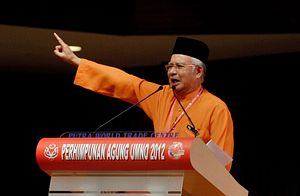KUALA LUMPUR – Reeling from the results of the last general election in 2013, Prime Minister Najib Razak attributed his party’s loss of the popular vote to a “Chinese Tsunami,” exposing the underbelly of race relations in Malaysia, although the true cause of the loss was more the country’s urban-rural divide. Faced with the looming necessity of a general election that must be called before mid-June 2018, the prime minister has been working overtime to remind his electorate of the benefits of supporting the ruling party, by doling out unsustainable aid, securing foreign investments, and rolling out policies like the National Transformation 2050 (TN50).
The Najib administration has hit the ground to continuously remind Malaysians that the country’s fundamentals remain strong and that the economy has been registering steady growth despite slowdowns in many parts of the region. Digesting government propaganda with increasingly vocal skepticism, Malaysians are unhappy with increase in oil prices, the decline of the ringgit, and the overall drop in purchasing power, resulting in shrinking savings. Since the global financial crisis, Malaysia has had its fair share of setbacks that have actively contributed to the current economic malaise.
Felda Global Ventures Holdings, the world’s third largest palm oil producer, is currently embroiled in a graft and mismanagement scandal. FGV, majority-owned by the Federal Land Development Authority (FELDA) buys its crop from small rural planters who form Najib Razak’s rural base. While CEO Zakaria Arshad was suspended on June 6, 2017 pending an internal probe, Chairman Isa Samad was transferred to the Land Transport Commission despite allegations that Arshad’s attempts to halt mismanagement at FGV were overruled by the board led by Samad. The hasty transfer was done to quell unrest at the company, restore confidence in a company which has seen its market capitalization drop by more than 60 percent since its initial public offering in June 2012, and calm jittery rural planters.
To further bolster support from rural areas, the prime minister launched the East Coast Rail Link (ECRL) on August 9, 2017. At the ground-breaking ceremony, which was attended by a high-level delegation from China, Najib called the link a “high-impact project that will seamlessly link the Klang Valley with the states of Pahang, Terengganu, and Kelantan,” three relatively rural but resource rich states. The infrastructure investment, worth MYR55 billion ($12.8 billion), is funded by Chinese firms and is slated for completion in 2024.
This foreign injection of funds is especially important in view of the shadow the 1Malaysia Development Berhad (1MDB) scandal has cast. The scandal has left Malaysians in doubt over the country’s resilience and prospects for foreign investment. The state investment fund is reported to be under investigation for money laundering in at least six jurisdictions, including the United States, Switzerland, and Singapore. The U.S. Justice Department has filed civil suits alleging that some $4.5 billion has been stolen from the fund. Investigators have traced some $700 million to Najib’s personal accounts, although the premier has consistently denied any wrongdoing.
On August 11, 2017, news broke that 1MDB had wired a total of $350 million, the first tranche of debt repayment owed to Abu Dhabi’s International Petroleum Investment Co. (IPIC), ahead of the deadline extension. The repayment certainly eases pressure on the investment fund and the government after it missed the original July 31 deadline for the repayment.
A lot is at stake during the 14th General Elections, and urban Malaysians who have had to bear the brunt of the current administration’s mismanagement of resources are finding it hard to look beyond these economic scandals. However, rural constituencies are being wooed by 1Malaysia People’s Aid (BR1M)’s investment in infrastructure, and continued agricultural subsidies.
With the national opposition in disarray, the elections seem to be Barisan Nasional’s to lose. Another five years at the helm, though, may not be sufficient to change Najib’s legacy of larger sovereign debt and greater inequality, despite a host of government policies seeking just the opposite.
Dominique F. Fernandes holds an LLB from the National University of Malaysia, and an LLM from Harvard Law School. She is an advocate and solicitor who has spent some seven years working in Malaysia’s public sector.

































